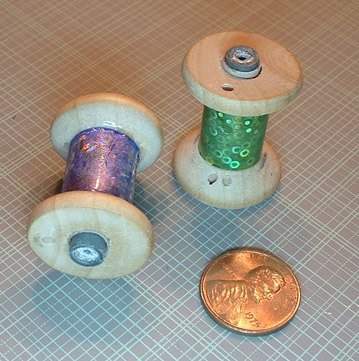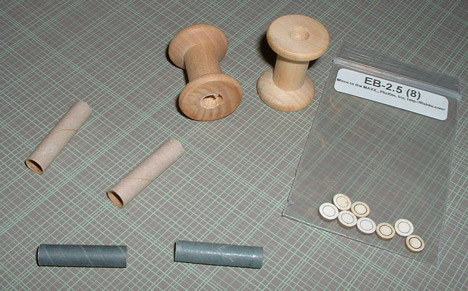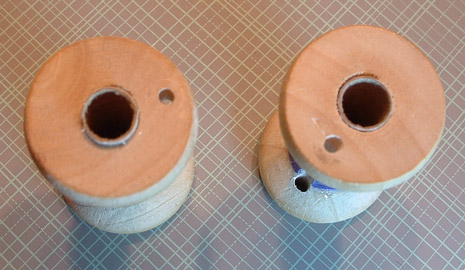Scratch Micromaxx Spool Rocket Original Design / Scratch Built
Scratch - Micromaxx Spool Rocket {Scratch}
Contributed by Mark Kulka
| Manufacturer: | Scratch |
 Brief:
Brief:
To a 3-year old with a hammer, everything looks like a nail. And to the rocketry-obsessed at any age, everything
eventually looks like a rocket. A chance trip to a craft store yielded the ideal material for a small spool rocket.
Construction:
Parts included:
- 7/8" hardwood mini-spool, "old-fashioned" style - Michael's Crafts
- FlisKits BT-2.5 (30mm) - motor tube
- FlisKits EB-2.5 - Micromaxx engine block
- Self-adhesive reflective trim
 There were a
variety of sizes, ranging from, as I recall, 1/2 inch in diameter all the way up to 2 inches in diameter. These widths
were for the major diameter; that is they represented the diameter of the flanges on the ends of each spool. There were
also two spool designs - the modern spool, with thin, narrow flanges just barely larger than the spool's
"waist" and "old-fashioned" spools with wide flanges that tapered down to a much narrower waist.
They all featured a hole drilled through the center that was proportional in size to the size of the spool.
There were a
variety of sizes, ranging from, as I recall, 1/2 inch in diameter all the way up to 2 inches in diameter. These widths
were for the major diameter; that is they represented the diameter of the flanges on the ends of each spool. There were
also two spool designs - the modern spool, with thin, narrow flanges just barely larger than the spool's
"waist" and "old-fashioned" spools with wide flanges that tapered down to a much narrower waist.
They all featured a hole drilled through the center that was proportional in size to the size of the spool.
The "modern" variety did not look like much more than simple cylinders, while the shape of the "old-fashioned" style spools just shouted "spool rocket," so I just had to decide on what size of them to get. Since the spools were all made from solid hardwood, I was concerned about how safely they might recover, especially the larger spools. The biggest spools, which might have been able to accommodate 13mm mini-motors, looked like they might present a hazard if they were launched without at least a streamer and they did not look like they would had enough room above the motor for one, so I decided to go for a smaller size that would be suitable for launching on a Micromaxx™ motor. The 7/8 inch diameter spools looked like the best choice. Grabbing a ruler from another aisle, I took some quick measurements. At just over 1 inch in height, with a 9/32 (0.28125) inch center hole, they were perfect! The small size and relative light weight (around 3 grams) of these spools meant that they could recover safely by just tumbling. I bought 6 spools.
 Building the rocket was not quite as
simple as it could get, but it was close. A Micromaxx™
motor fits loosely into the 7/8 inch spool's center hole and with a few wraps of masking tape, you could just friction
fit the motor into it and go. But I didn't want to even have to bother with doing that, so I constructed a motor mount
for my spool. The center hole just happened to be the same diameter as the OD of FlisKits™
BT-2.5 which is the tubing used to make the motor tubes for their "Micro To The Maxx" line of MMX®
kits. I already had some of this tubing on hand so I simply cut a length of it that was equal to the height of the
spool - 30mm. Next I used a toothpick to apply a small bead of Elmer's Glue-All®
about 3/16 of an inch into one end of the tube. Using a spent Micromaxx™
motor that I had glued onto the end of a bamboo skewer, I pushed a FlisKits EB-2.5®
engine block into the tube from the other end until the end of the motor was almost flush with the end of the tube (I
left about 1/32 of an inch hanging out) and then quickly withdrew the spent motor. I let the glue cure for awhile
before proceeding.
Building the rocket was not quite as
simple as it could get, but it was close. A Micromaxx™
motor fits loosely into the 7/8 inch spool's center hole and with a few wraps of masking tape, you could just friction
fit the motor into it and go. But I didn't want to even have to bother with doing that, so I constructed a motor mount
for my spool. The center hole just happened to be the same diameter as the OD of FlisKits™
BT-2.5 which is the tubing used to make the motor tubes for their "Micro To The Maxx" line of MMX®
kits. I already had some of this tubing on hand so I simply cut a length of it that was equal to the height of the
spool - 30mm. Next I used a toothpick to apply a small bead of Elmer's Glue-All®
about 3/16 of an inch into one end of the tube. Using a spent Micromaxx™
motor that I had glued onto the end of a bamboo skewer, I pushed a FlisKits EB-2.5®
engine block into the tube from the other end until the end of the motor was almost flush with the end of the tube (I
left about 1/32 of an inch hanging out) and then quickly withdrew the spent motor. I let the glue cure for awhile
before proceeding.
I test fit the motor tube into the spool's center hole. It slid in fine but the fit was snug and there was increasing resistance at the far end. I withdrew the tube and used a 9/32 inch drill bit to even out the hole's diameter. Then applied a drop of Elmer's just inside one end of the center hole and then slid the motor tube back in from the other end until it was flush on both ends.
The distance from the outer edge of the center hole to the outer edge of the flange was 0.5 inches so I placed a mark on the flange halfway out, or 0.25 inches, from the edge of the center hole. Clamping the spool into my hobby vise and using a 1/16 inch drill bit in my Dremel™, I drilled a hole as straight as I could through one flange. I could have done this much more accurately with a drill press, if I actually had one. Then, using the first hole as a drill guide and making sure that the bit was parallel to the center axis of the spool, I drilled another hole through the other flange. The two holes comprised the launch lug for the rocket.
Finally, I cut out a 5/8 inch by 1-5/8 inch piece out of a sheet of self-adhesive holographic plastic trim that I had and wrapped it around the center waist of the spool. That completed the construction of my Micromaxx™ Spool Rocket. I immediately made a second one, decorating it with a different color of holographic trim.
A MicromaxxII® motor fits into the installed mount snugly enough that it does not require any tape for a friction fit and the engine block prevents it from shifting forward in the mount when it is firing. As long as the forward end of the mount is kept open, the motor will stay in the mount and will not be kicked out by the ejection charge.
PROs: Easily built out of inexpensive materials in less than 15 minutes.
CONs: Drilling the launch lug holes in a straight line through both flanges by hand is a little tricky.
Finishing:
The turned wooden spool has a rock-hard, sealed and smoothly finished surface, so no additional finishing is
required. I strongly recommend trimming it, though, with a bright shiny material or at least painting it a bright
fluorescent color in order to aid in tracking it in the air and locating it on the ground.
Flight:
There is only one motor that will fit, of course: the 6mm Quest MicromaxxII®,
or 1/8A.5-1, motor. The very short 0.8 to 1.0 second delay of this motor is not a problem with this rocket. The motor
can simply be friction-fitted into the mount without needing anything else for retention. I made all flights in my
driveway, using my Quest Silo Pad®,
that I had mounted on a tripod, as a launch platform and using my 12 volt system for the ignition power. In keeping
with my usual practice with black powder motors, I placed the motor in the mount first then prepped and inserted the
igniter. I used QMX™
igniters that I had removed from their plastic plug housings. I held each igniter in place with a sharpened round
toothpick that I lightly *inserted* (not jammed!) into the nozzle of the motor and held it in place with one hand while
I lowered the spool into the launch rod. The toothpick, when it was propped against the base of the pad, served as both
an igniter support and as a stand-off.
I made three consecutive flight with each spool rocket. Almost all of the flights had an identical profile: the spool quickly shot straight up to about 60-70 feet, arcing over or weather-cocking near the top of each flight. Right at apogee, the ejection charge fired and the spool, clearly tumbling end over end at that point fell to the ground in a more or less ballistic path about 10 to 20 feet away from the pad. (Since I was launching on my driveway, the slope which may led to longer recovery distances than might otherwise have occurred.) In two flights (one for each spool), the spools did not arc over in flight; one landed within inches of the pad, and the other actually hit the pad during recovery. After 3 flights each, the spools showed no signs of any damage at all, not even a burn mark or soot residue. The motors were retained in all 6 flights.
Recovery:
As I noted above, the spools were clearly seen tumbling head over heels after the ejection charge fired as they
descended. The combination of tumbling-induced drag, the spools' light weight, and the fact that, with no more than 70
feet of altitude to drop from, they would not have been able to reach terminal velocity in any event, resulted in safe
recoveries each time. Most of the landings were in my gravel driveway; a couple of times, they landed on the lawn, and
one flight arced far enough down the driveway that the impact zone was at the edge of the street. I had no problems
finding each spool on the ground, and neither spool showed even a hint of damage after 3 flights each.
PROs: Safely and effectively recovers using tumble recovery. Low altitude and close recovery facilitates locating the tiny spool on the ground after it lands. The use of bright reflective trim on the spool also helps with visibility in the air and on the ground. Very durable construction virtually eliminates the risk of damage to the rocket.
CONs: None, other than the usual need to keep an eye on it to see where it flies to and where it lands.
Summary:
These are "spool rockets" in the most literal sense. At just over 1 inch in height, the two spools are the
smallest model rockets that I have ever built and launched. They are also extremely rugged; I could carry them around
in my hip pocket with my keys all day without causing any damage to them. The Micromaxx™
Spool rocket is stable in flight, with a fast boost and a tumble recovery. It is also very simple and inexpensive to
build. Unlike other, more sleek designs, this particular Micromaxx™
rocket is very watchable in flight. It lifts off fast but then slows down quickly as it coasts to apogee, and then
tumbles end over end back to the ground. Because of its low flight altitude, it is not difficult to track. The spool
rocket's very small size might lead one to expect that it would be difficult to find after recovery but because its
landings are observable and it recovers so close to the pad, locating it on the ground has been quick and effortless.
Due to the rocket's very light weight, it can safely recover just by tumbling, without needing to deploy a recovery
device.
Other:
Once one gains an understanding of what is needed to make a rocket stable in flight, a great many everyday items
begin to look like candidates for conversion into rockets. This can be both a blessing and a curse. But the next time
that your significant other wants to pick up a few things at the local crafts store, don't hesitate to tag along. You
may end up bringing home the biggest shopping bag!
 |
 |
Flights
 |
 |